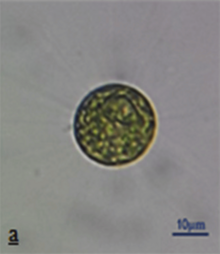Golenkinia
| Golenkinia | |
|---|---|

| |
| Golenkinia radiata | |
| Scientific classification | |
| Clade: | Viridiplantae |
| Division: | Chlorophyta |
| Class: | Chlorophyceae |
| Order: | Sphaeropleales |
| Family: | Neochloridaceae |
| Genus: | Golenkinia Chodat, 1894[1] |
| Type species | |
| Golenkinia radiata Chodat[1] | |
| Species[1] | |
Golenkinia is a genus of green algae first described in 1894 by Robert Chodat.[1] The genus is named for the Russian phycologist Mikhail Iljitsch Golenkin.[2] Golenkinia species live in fresh water (including bodies of black water such as Winyah Bay)[3] and are found around the world.[4]
Description
Members of Golenkinia are spherical unicellular organisms with numerous radiating spines. They contain a single walled cup-shaped chloroplast, which in turn contains a pyrenoid in its base.[4] The pyrenoid is typically sheathed in starch.[5] The pyrenoid is usually reniform, which distinguishes them from members of the similar and taxonomically-confused genus Golenkiniopsis.[5]
Species of Golenkinia are typically solitary and do not form colonies or coenobia except under laboratory conditions.[5] Their slender spines may become entangled, creating the false impression that the algae have formed a colony.[6]
Taxonomic status
The precise taxonomic status of Golenkinia is somewhat unclear due to the large number of revisions it has undergone.[7] It has traditionally been classed with other round, spine-bearing green algae, many of which are now assigned to the class Trebouxiophyceae.[8]
In 1982, Hanuš Ettl and Jiří Komárek placed Golenkinia with Chlorotetraedron and Polyedriopsis in the family Neochloridaceae, under the order Sphaeropleales.[7] In 1983, Komárek and Bohuslav Fott created the family Golenkiniaceae to contain unicellular algae with round cells that had spines on the cell wall. The genera Golenkinia and Polyedriopsis were placed within it.[7]
Subsequent analysis of 18S rDNA in 2003 has found that Golenkinia and Polyedriopsis are not in fact closely related.[9] The same research assigned Golenkinia to the order Chlamydomonadales.[9]
Further analysis in 2015 found that Golenkinia was loosely related to Jenufa and Treubaria, all together possibly representing a branch in Chlamydomonadales that would be a sister clade to order Sphaeropleales.[7] This proposed clade remains unnamed, and its taxonomy is still not completely clear, despite further rDNA analysis performed in 2017.[8]
Because of the frequent changes to its classification, some databases still show Golenkinia belonging to Golenkiniaceae.[10]
References
- ^ a b c d Guiry, M.D.; Guiry, G.M. "Golenkinia". AlgaeBase. University of Galway.
- ^ Baker, A.L. et al. 2012.Golenkinia at Phycokey – an image-based key to Algae (PS Protista), Cyanobacteria, and other aquatic objects. University of New Hampshire Center for Freshwater Biology. 7 April 2018.
- ^ Lawrenz, Evelyn; Pinckney, James L.; Ranhofer, Melissa L.; MacIntyre, Hugh L.; Richardson, Tammi L. (September 2010). "Spectral Irradiance and Phytoplankton Community Composition in a Blackwater-DominatedEstuary, Winyah Bay, South Carolina, USA". Estuaries and Coasts. 33 (5). Coastal and Estuarine Research Federation: 1193. doi:10.1007/s12237-010-9310-5. JSTOR 40863488. S2CID 84766894.
- ^ a b Hoek, Christiaan; Mann, David; Jahns, H. M. (1995). Algae: An Introduction to Phycology. Cambridge University Press. p. 365. ISBN 9780521316873.
- ^ a b c John, David M. (25 April 2002). The Freshwater Algal Flora of the British Isles: An Identification Guide to Freshwater and Terrestrial Algae. Cambridge University Press. p. 357. ISBN 9780521770514.
- ^ "Golenkinia". Manaaki Whenua – Landcare Research. Retrieved 8 April 2018.
- ^ a b c d Lemieux, Claude; Vincent, Antony T.; Labarre, Aurélie; Otis, Christian; Turmel, Monique (1 December 2015). "Chloroplast phylogenomic analysis of chlorophyte green algae identifies a novel lineage sister to the Sphaeropleales (Chlorophyceae)". BMC Evolutionary Biology. 15: 264. doi:10.1186/s12862-015-0544-5. ISSN 1471-2148. PMC 4665822. PMID 26620802.
- ^ a b Buchheim, Mark A.; Müller, Tobias; Wolf, Matthias (2017). "18S rDNA sequence-structure phylogeny of the Chlorophyceae with special emphasis on the Sphaeropleales". Plant Gene. 10: 45–50. doi:10.1016/j.plgene.2017.05.005.
- ^ a b Wolf, Matthias; Hegewald, Eberhard; Hepperle, Dominik; Krienitz, Lothar (1 July 2003). "Phylogenetic position of the Golenkiniaceae (Chlorophyta) as inferred from 18S rDNA sequence data". Biologia. 58: 433–436 – via ResearchGate.
- ^ "Golenkinia". Integrated Taxonomic Information System.
